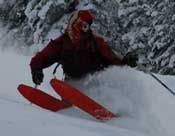The wetting out looks great. I'm not sure whether you need to be too concerned about the uniformity of the resin prior to pressing. If you are, then it simply a matter of squeezing the top of the cup to make a spout and doing a couple of runs up and down the fabric.
More broadly, (hijacking the thread a bit) I would suggest that we have all missed a big step during press construction - at least its not been mentioned. No-one appears to calibrate their press prior to use. Ideally the approach is to use a blank, but if not, the first thing everyone should do, once their first set of skis have seen the snow, is to cut them up tip to tail - 3cm cross-sections.
You will then know:
- whether the press is delivering a consistent pressure, tip to tail, side to side,
- confirm the thickness of the laminate i.e. too much or too little pressure (broadly speaking),
- whether air is getting trapped,
- whether epoxy is getting trapped,
- whether fabrics, vds etc are moving around in excess epoxy,
- whether parts are moving laterally,
- whether there are gaps between parts
- whether the rebate is too wide to narrow, etc
More is to be learnt, once you look at cross-sections via a USB micro-scope $20.00 or so.
Just a thought, not mandatory )
Oh yeah - cutting is a bit tricky. The ski needs to be clamped in place etc. Cut the edges and then think about cutting the laminate.
Random questions
Moderators: Head Monkey, kelvin, bigKam, skidesmond, chrismp
Sure its better to cut up, but how many of us like to cut up nice boards 
Me it helped a lot to start transparent (with vaac). Could see movements, trapped resin, dry spots, air, thickness of laminate (limited of course)...
I would say except point 1 and partly point 2 you can evaluate the others going transparent.
If you do/plan to do bigger scale of boards your idea makes sense, otherwise its a cash/budget related problem for many people
Me it helped a lot to start transparent (with vaac). Could see movements, trapped resin, dry spots, air, thickness of laminate (limited of course)...
I would say except point 1 and partly point 2 you can evaluate the others going transparent.
If you do/plan to do bigger scale of boards your idea makes sense, otherwise its a cash/budget related problem for many people
Tom
Option 1. Make a press (vacuum doesn't count btw )))) and press away!
No-one is required to do this, and I'll admit, for those who just enjoy keeping it simple - carry on, why spoil the fun.
Option 2. Make a press and test its performance using a blank.
What should the blank look like?
- Full length core - ideally tip/tail?
- Base material
- Two piece edge set, running length only
- Clear VDS, apparently someone is making clear VDS
- Base material - in place of topsheet
None of the above need to be ski shaped, except the core, that needs to be profiled and ideally dried down to (towards) 6% moisture content.
Benefits:
- First layup anyone ever does will be a guaranteed success. Important information will be captured and available to the forum. No doubt or question about it
- Any questions arising as a result of the first layup can be answered by the forum
- Any issue with the press can be dealt with and fixed - no more imaginary faults
- Second layup will use less epoxy, close to what is required
- Much less epoxy will be used long term, a real cost saving.
- The layup procedure with reflect what is required of it. Issues fixed, time saved, exposure to epoxy much reduced
- More time on your board, which will be better by design and less time spent in the workshop.
And the downside is what?
No-one is required to do this, and I'll admit, for those who just enjoy keeping it simple - carry on, why spoil the fun.
Option 2. Make a press and test its performance using a blank.
What should the blank look like?
- Full length core - ideally tip/tail?
- Base material
- Two piece edge set, running length only
- Clear VDS, apparently someone is making clear VDS
- Base material - in place of topsheet
None of the above need to be ski shaped, except the core, that needs to be profiled and ideally dried down to (towards) 6% moisture content.
Benefits:
- First layup anyone ever does will be a guaranteed success. Important information will be captured and available to the forum. No doubt or question about it
- Any questions arising as a result of the first layup can be answered by the forum
- Any issue with the press can be dealt with and fixed - no more imaginary faults
- Second layup will use less epoxy, close to what is required
- Much less epoxy will be used long term, a real cost saving.
- The layup procedure with reflect what is required of it. Issues fixed, time saved, exposure to epoxy much reduced
- More time on your board, which will be better by design and less time spent in the workshop.
And the downside is what?

